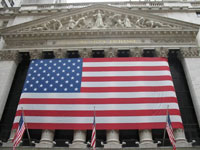

Stocks are “equity investments” which means that when you own shares of a company you own part of that company. For example, if you own 1,000 shares of Apple Computer stock and Apple has 1,000,000 shares that are “issued and outstanding,” then you own 0.1% of the company. If Apple were then to be sold to another company for $50,000,000, then each share would be worth $50 ($50 million divided by 1 million shares). At $50 a share, you would receive $50,000 for your 1,000 shares.
So, as a stock owner, you are really becoming a business owner. And what do business owners care about? Increasing sales and minimizing expenses. When a company is increasing its sales and minimizing (or at least controlling their expenses) they are increasing their profits and making money! Remember—”Cash is King” and “He who has the gold rules!”
Therefore, the price of a stock is simply the market’s determination of the company’s value. That value is dependent on its assets, its current profits, and its expected future profits.
What is a Stock?
When business is good and companies are making lots of money (or even if the expectation is that the business climate will improve in the near future), the prices of stocks generally rise. The opposite is also true: when businesses do poorly (or even if the expectation is that the business climate will decline in the near future), the prices of stocks generally fall.
The place where you can buy or sell shares of stock is called a “stock exchange”. In the U.S. there are three major exchanges: the American Stock Exchange (AMEX), the NASDAQ and the New York Stock Exchange (NYSE), which are located on Wall Street in lower Manhattan in New York City.
Exchanges play a key role in the financial markets. When a company raises money in a stock offering it sells shares directly to the initial investors. But when those investors no longer want to hold shares, the exchanges provide a place where buyers and sellers come together to buy and sell shares. This is called “liquidity”. If you owned 1,000 shares of Apple Computer (ticker symbol = AAPL) but you couldn’t find anybody willing to buy it, then it would really be worthless. But if you knew you could call you broker and your broker could send an order to an exchange where all of the buyers would be standing by, then you could be confident that your shares would be sold to the highest bidder. The exchanges provide this liquidity and help insure that sellers get the highest price possible and buyers can buy at the lowest price possible.
Investors can make money with stocks two ways: 1) through the rise in price of a stock, and 2) through the dividends that companies pay out to their shareholders. Companies that have stable earnings and are generating more cash than is needed to fund additional growth opportunities pay out part of their reserves as “dividends.” It is a direct cash outlay per share owned. Companies will actually send you checks in the mail (typically every 3 months) for owning their stock!
Some larger companies will even take that cash dividend that they would normally pay you and buy you additional shares of the company. This is called a DRIP (Dividend Re-Investment Plan). If your Apple stock paid a cash dividend of $1 per share, then your 1,000 shares of Apple would earn you $1,000. If you chose to participate in the Apple DRIP, and Apple was trading at $100 on the date the dividend is paid, your $1,000 dividend would purchase you 10 more shares of Apple stock. And yes, you will usually end up with fractional shares.
General Electric (GE) is currently paying out $0.75 year and the stock is at $16.00 so it is paying out a 4.6875% dividend yield. That’s a great return when banks are paying out less than 1%.
Over long periods of time, stocks have proven to be a very valuable investment because of their very good returns. Over the last 100 years, stocks have gone up, on average, about 6% per year. Dividends add about another 1.5% per year.
| Stocks Rise in Value | Stock Dividends | Total Stock Return |
|---|---|---|
| 6 percent | 1.5 percent | 7.5 percent |
As you are probably aware, the prices and values of stocks are volatile. Some can change dramatically, for better or worse, and rapidly while others can remain stable for long periods. Unlike most bank checking and savings accounts, investments in stocks are NOT guaranteed by the FDIC.
Many people are afraid to start picking individuals stocks and would rather pay money managers on Wall Street to invest for them. In the United States, over $1.7 Trillion is invested in mutual funds.
